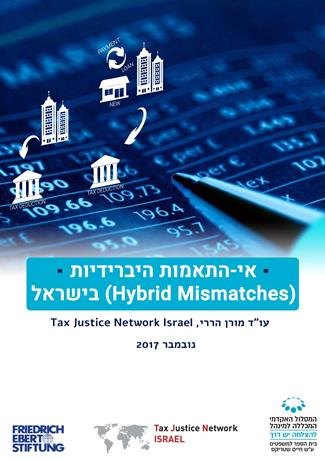
Tax Justice Network Israel (TJN IL), in cooperation with Friedrich Ebert Stiftung, has published a new report on ‘Hybrid Mismatches in Israel’. The term “hybrid mismatches” refers to discrepancies in the tax laws of two or more independent tax jurisdictions or territories in relation to the classification of a legal entity or financial instruments for tax purposes. The hybrid component refers, for example, to the classification of a legal entity as a partnership in one country and as a company in another country, or the classification of a financial instrument such as Profit Participation Loans as a capital investment in one country and a debt in another country. A tax planning which involves the use of hybrid mismatches takes advantage of the tax discrepancies between jurisdictions in order to reduce the tax rate, which then erodes the tax base of at least one of the two countries.
The main reasons that hybrid mismatches are one of the most common and problematic elements of tax planning are the variety of combinations they include and the difficulty in identifying whether and under what circumstances they are used to evade tax. The expertise for understanding the various forms and designs of hybrid mismatches requires time, experience and knowledge, all of which are considered valuable resources for the tax authorities.
Not only does the use of hybrid mismatch for tax reduction lead to base erosion and profit shifting but it also increases tax competition between jurisdictions for attracting foreign investment, and thus poses a risk regarding destructive race to the bottom policies. In addition, compared with medium and small businesses, tax schemes which involve hybrid mismatches for tax reduction are used far more by international companies whose business operations dominate several countries. This advantage undermines fair competition between businesses and harms economic efficiency. Finally, the use of hybrid mismatches creates an unfair advantage for taxpayers whose income is mainly from capital (compared with taxpayers whose income is mainly from employment) and who can pay for professional financial service providers to design their tax schemes.
In this report we look at
the different types of hybrid mismatches
recent developments – both in Israel and abroad – on hybrid mismatches, including Action 2 of the OECD’s BEPS project, the EU Anti- Tax Avoidance Directive (ATAD) and the Multilateral Convention to Implement Tax Treaty Related Measures to Prevent Base Erosion and Profit Shifting (MLI).
the various ways they are often used by corporations
the risks to society as a result of their use for the purpose of tax reduction
policy recommendations for the Israeli government





Leave a Reply